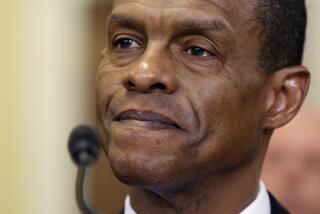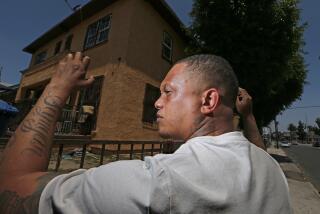Would a European Diallo Be Dead?
- Share via
The tragic death of an unarmed immigrant, Amadou Diallo, and the pain felt by so many as a result of the recent acquittal of the four New York police officers who shot him, require immediate action to ensure that such a senseless act never occurs again. The killing of two unarmed black men by New York police in subsequent incidents makes the situation all the more compelling.
The sense of outrage from the Diallo shooting has been measured, with protesters asking the justice system to respond appropriately and denouncing the violence that cost Diallo his life. Now that the first step in the justice system has exonerated the officers, it is important that efforts to address this tragedy are increased rather than diminished:
* President Clinton should ensure that the Justice Department conducts a complete and thorough investigation of this incident. No stone should be left unturned in investigating the factors that led to such a tragic and senseless death, including obtaining all of the facts about the New York Police Department’s Street Crimes Unit, to which the four officers belonged, and its training, practices and policies.
* The Commission on Civil Rights, which held hearings last year focusing on the NYPD, must ensure that its report and recommendations encompass the Diallo case.
* We must examine the way we deploy law enforcement officers to fight crime. Black people are more often the victims of crime. We strongly support police efforts to prevent and reduce the prevalence of crime in our communities. The success of crime prevention programs in cities like Boston and San Diego illustrates that partnerships between communities and the police can achieve the dual goal of preserving and maintaining respect for communities of color and providing protection and policing. Our commitment to fighting crime, however, should not be viewed as forfeiting our rights of privacy and freedom to travel or as approving practices that lessen our rights as citizens. We should not be forced to choose between public safety and personal security.
* To the extent that the police officers’ conduct--firing 41 shots at Diallo, 19 of which hit him--is consistent with police procedures and policies, such practices must end. It is reported that many police practices instruct officers to discharge their weapons not for the arguable purpose of subduing or fatally wounding a suspect, but for the purpose of protecting themselves and each other from individual culpability. This sinister expression of solidarity has no purpose in a civilized society, and the president, governors, mayors and police chiefs should take immediate steps to eliminate such practices.
While many are talking around the issue of race, we believe it is a matter of central importance in the Diallo case. The problems of racism, conscious and subconscious, must be addressed immediately. We must not ignore the underlying pervasive and lingering rage that an incident like this generates. Kadiatou Diallo, Amadou’s mother, came to America to bury her son and to seek answers for his death. As she sat through the trial, with her first observance of our system of justice at work, she had to experience pain, sadness and shock at hearing defense lawyers argue that her son was, in large part, responsible for his own death.
It is not enough for leaders to question the competence of the prosecution or to call for a Justice Department investigation or even to empathize with outraged citizens. This is also a moment for leaders to teach Americans about the continuing power of color in the lives of average people. Few of us are immune from the toxins of racial mistrust and misunderstanding, but law enforcement professionals must be held to a higher standard because they are public servants armed with the discretion and power both to destroy and to save lives. We share the somber view of many that had Diallo been a European immigrant in a white neighborhood, he would be alive and unharmed today.
Black mothers understandably must fear the risk that their sons or spouses will be mistaken for suspects and face similar fates. The disturbing number of such shootings requires us to reexamine how race plays a role in the expectations, suspicions and even fears of all police officers and results in tragedies like the Diallo case.
More to Read
Sign up for Essential California
The most important California stories and recommendations in your inbox every morning.
You may occasionally receive promotional content from the Los Angeles Times.










